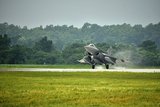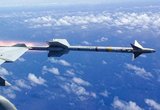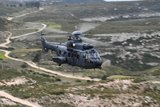Electronic warfare system prototype for US Super Hornets to be built by Raytheon
Raytheon said its ADVEW offering would provide significant performance upgrades by modernising existing electronic warfare systems on the Super Hornet. (Photo: US DoD)
The US Navy has awarded Raytheon a US$80 million contract for a prototype Advanced Electronic Warfare (ADVEW) for its F/A-18 E/F Super Hornet.
ADVEW will be considered as a replacement for the existing AN/ALQ-214 integrated defensive electronic countermeasure and AN/ALR-67(V)3 radar warning receiver.
‘These advancements are paving the way for the next generation of electronic warfare,’ said Bryan Rosselli, president of advanced products and solutions at Raytheon. ‘We are completely replacing and consolidating the legacy systems into a one-box solution that will deliver a generational refresh to the electronic warfare capability for the lifetime of the Super Hornet.’
According to the US Naval Air Systems Command (NAVAI), the F/A-18 aircraft programme has resulted in a highly capable fighter across the full mission spectrum: air superiority, fighter escort, reconnaissance, aerial refuelling, close air support, air defence suppression and day/night precision strike.
The F/A-18E and F/A-18F aircraft have been designed to fulfil the present needs of navy fighter escort and interdiction missions. They also play a vital role in upholding air defence and providing close air support within the F/A-18 fleet. The enhancements integrated into the F/A-18E/F models encompass augmented range and enhanced carrier compatibility, designed to enable the F/A-18 to persist in its role as a strike fighter.
Raytheon said its ADVEW offering will provide significant performance upgrades by modernising existing EW systems into fewer components and incorporating government-defined open architecture.
Related Equipment in Defence Insight
More from Air Warfare
-
![Focus on economy over capability highlights the cost imperative for CCA success]()
Focus on economy over capability highlights the cost imperative for CCA success
Striking the right balance between cost and capability is likely to become more crucial in the increasingly competitive collaborative combat aircraft market. Shephard’s special CCA market report examines where the opportunities lie for suppliers.
-
![Saudi Arabia air report: The world’s fourth-largest UAV market seeks to strengthen domestic industry]()
Saudi Arabia air report: The world’s fourth-largest UAV market seeks to strengthen domestic industry
With $9.18 billion in uncontracted programmes — including a potential multi-billion-dollar MQ-9B deal — Saudi Arabia’s UAV sector is poised for significant further growth and industrial expansion.
-
![AI mission-autonomy software integration and partnerships see progress across CCA efforts]()
AI mission-autonomy software integration and partnerships see progress across CCA efforts
The successful integration of third-party mission autonomy in the US Air Force’s CCA programme and movement on Helsing’s Europa CA-1 timelines mark key milestones in the development of uncrewed aerial capabilities.
-
![Airbus Helicopters is deepening its European reach as NATO orders climb]()
Airbus Helicopters is deepening its European reach as NATO orders climb
Airbus has delivered more than 2,000 helicopters to nations across Europe, and continues to solidify its position at the heart of the region’s defence industrial base.






















